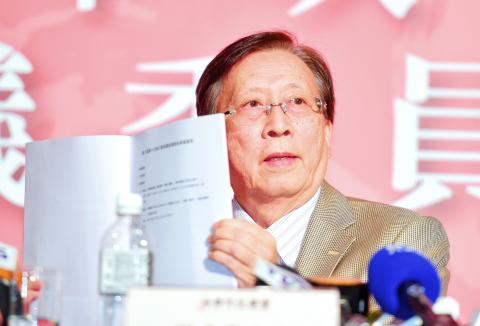An executive meeting of the General Association of Chinese Culture (GACC) set to review the membership of President Tsai Ing-wen (蔡英文) yesterday was called off amid speculation that the group was to elect a new president to prevent Tsai from assuming leadership of it.
The meeting to review the Tsai’s application and those of 624 other potential members was canceled due to lack of a quorum.
Association president Liu Chao-shiuan (劉兆玄), whose term expired yesterday, rejected accusations that the group was trying to deny membership to Tsai and the others, saying the review of membership applications was on the meeting’s agenda.

Photo: Wang Wen-lin, Taipei Times
Liu criticized 12 executive members who issued a joint statement on Sunday urging the association to convene the needed meetings for a leadership transition, because they were all absent yesterday.
The 12 members included Chinese Nationalist Party (KMT) Legislator Wang Jin-pyng (王金平), the former legislative speaker; former United Microelectronics Corp chairman Robert Tsao (曹興誠); Fubon Financial Holdings chairman Daniel Tsai (蔡明忠); Shin Kong Financial Holding chairman Eugene Wu (吳東進) and Taiwan Cement Corp chairman Leslie Koo (辜成允).
Their statement said the association should complete the induction of new members in due course to facilitate a leadership transition without provoking unnecessary conflicts, amid rumors that the association’s 35-person executive committee wanted to elect a new president to prevent Tsai Ing-wen from succeeding Liu.
“I think it is apparent to everyone who caused the meeting to be aborted. I am confused and disappointed [by their action],” Liu said.
The nation’s president has traditionally led the GACC, which was established to help promote cultural affairs and bridge the gap between the president and cultural circles.
Former president Ma Ying-jeou (馬英九) broke with tradition by appointing Liu to head the association after the former premier left office in 2009.
There has been criticism, especially among the pan-green camp, over the association’s failing to members as they left, with some legislators calling it an attempt by the former KMT administration to privatize the GACC’s assets and to use it as a platform for cross-strait ties for its own purposes.
Democratic Progressive Party caucus chief executive Wu Ping-jui (吳秉叡) told a news conference that the association, which was founded in 1967 with 70 percent of its founding capital raised from state-owned businesses, should be a public asset managed by the state, but Liu has been working the association to deny membership to Tsai Ing-wen and new members.
The delay in a leadership transition is an attempt to make the association a private body and the association assets, which are worth NT$1.9 billion (US$59.6 million), private property, Wu said.
However, Liu yesterday reiterated that the association is a private organization and its is only subject to the Civil Associations Act (人民團體法) and related regulations, while its assets are private property.

Japanese footwear brand Onitsuka Tiger today issued a public apology and said it has suspended an employee amid allegations that the staff member discriminated against a Vietnamese customer at its Taipei 101 store. Posting on the social media platform Threads yesterday, a user said that an employee at the store said that “those shoes are very expensive” when her friend, who is a migrant worker from Vietnam, asked for assistance. The employee then ignored her until she asked again, to which she replied: "We don't have a size 37." The post had amassed nearly 26,000 likes and 916 comments as of this

US President Donald Trump said "it’s up to" Chinese President Xi Jinping (習近平) what China does on Taiwan, but that he would be "very unhappy" with a change in the "status quo," the New York Times said in an interview published yesterday. Xi "considers it to be a part of China, and that’s up to him what he’s going to be doing," Trump told the newspaper on Wednesday. "But I’ve expressed to him that I would be very unhappy if he did that, and I don’t think he’ll do that," he added. "I hope he doesn’t do that." Trump made the comments in

Tourism in Kenting fell to a historic low for the second consecutive year last year, impacting hotels and other local businesses that rely on a steady stream of domestic tourists, the latest data showed. A total of 2.139 million tourists visited Kenting last year, down slightly from 2.14 million in 2024, the data showed. The number of tourists who visited the national park on the Hengchun Peninsula peaked in 2015 at 8.37 million people. That number has been below 2.2 million for two years, although there was a spike in October last year due to multiple long weekends. The occupancy rate for hotels

A cold surge advisory was today issued for 18 cities and counties across Taiwan, with temperatures of below 10°C forecast during the day and into tonight, the Central Weather Administration (CWA) said. New Taipei City, Taipei, Taoyuan and Hsinchu, Miaoli and Yilan counties are expected to experience sustained temperatures of 10°C or lower, the CWA said. Temperatures are likely to temporarily drop below 10°C in most other areas, except Taitung, Pingtung, Penghu and Lienchiang (Matsu) counties, CWA data showed. The cold weather is being caused by a strong continental cold air mass, combined with radiative cooling, a process in which heat escapes from